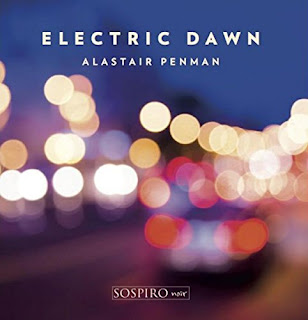Alastair Penman, Graham Fitkin, Jenni Watson, Daniel Harle, Geof Sheil, Marius Neset; Alastair Penman; Sospiro noir
Reviewed by Robert Hugill on Dec 6 2015
Star rating:
Young saxophonist exploring the boundaries between acoustic and electronic
Electric Dawn is a new disc from the young saxophone player Alastair Penman in which he combines the possibilities of acoustic and electronic music. The works on the disc include Penman's own alongside music by Jenni Watson, Daniel Harle, Graham Fitkin, Geoff Sheil and Marius Neset. The disc was produced by the distinguished saxophone player John Harle, and Harle has evidently been a guiding influence throughout the whole process of developing the album.
Reviewed by Robert Hugill on Dec 6 2015
Star rating:
Young saxophonist exploring the boundaries between acoustic and electronic
Electric Dawn is a new disc from the young saxophone player Alastair Penman in which he combines the possibilities of acoustic and electronic music. The works on the disc include Penman's own alongside music by Jenni Watson, Daniel Harle, Graham Fitkin, Geoff Sheil and Marius Neset. The disc was produced by the distinguished saxophone player John Harle, and Harle has evidently been a guiding influence throughout the whole process of developing the album.
Alastair Penman is a British saxophone player and clarinettist and he plays with the Borealis Saxophone Quartet (see my review of their recent disc). Penman obtained masters’ degrees in both Information and Computer Engineering (University of Cambridge) and Saxophone Performance (Royal Northern College of Music). This combination has given Alastair has a strong interest in the fusion of live saxophone performance with electronic effects, backings, and enhancements to create often previously undiscovered sound-worlds, something which has driven the creation of this disc.
In his introductory note on the disc, Penman talks about allowing the electronic effect and techniques to augment and extend the acoustic instruments, rather than overpower them. By and large he has been successful in that at times on the disc it is difficult to assess quite who is playing and where acoustic Penman breaks off and electronics start.
The disc is bookended by a pair of Penman's works, Supernova and Hypernova, in which his jazz-inspired rhapsodic saxophone soars over electronic atmospherics.
 |
| Alastair Penman |
Higher is by Daniel Harle, a young freelance acoustic and electronic composer, and involves Daniel Harle's synthesiser programming. Over a background of electronic white noise we are presented with fragments of saxophone melodies which gradually coalesce. Graham Fitkin's Glass was originally written for soprano saxophone and piano, but is here performed in Alastair Penman's arrangement for an accompaniment of saxophones, bass clarinets and piano supporting the lyrical saxophone solo. It creates something rather lovely, though perhaps more conventional sounding than some of the pieces on the disc.
Alastair Penman's Wayfarer is performed in an arrangement by John Harle, with electronics programming by Penman and Harle. It is clearly process music, yet could hardly be described as minimalist. The repetitive elements create a multi-layered sometimes complex piece. Hail by the Irish composer Geoff Sheil pits the saxophone against Sheil's electronic backdrop, with the sense that the sax with its jazz riffs gradually breaks free of the electronics.
Lake of Dreams by Alastair Penman, with his own electronic programming, is a soulful piece with a lyrical saxophone solo. Penman's Sandbox has a similar haunting feel, starting quietly intense and then developing into something up-tempo and rhythmically catchy, with the saxophone solo having a rather bravura feel. Swan Island is by the Norwegian jazz saxophonist Marius Neset, performed in Penman's arrangement for alto saxophone, bass clarinet and synthesizers. It comes over as more traditional in structure, a classical take on a jazz piece, and still rather soulful. Alastair Penman's Broadside is a folk-ish uptempo piece with a heavy rhythmic accompaniment.
Throughout, Penman's saxophone playing is exemplary and the whole makes and appealing and intriguing disc which successfully mixes Penman's live saxophone with the electronics to create something rather different. Displaying Penman's virtuosity, the music on the disc encompasses a wide range of style.
Alastair Penman - Supernova
Jenni Watson - Deconstruct
Alastair Penman, arr. \John Harle - Ghost Train
Daniel Harle - Higher
Graham Fitkin, arr. Alastair Penman - Glass
Alastair Penman, arr. John Harle - Wayfarer
Geoff Sheil - Hail
Alastair Penman - Lake of Dreams
Alastair Penman - Sandbox
Marius Neset, arr. Alastair Penman - Swan Island
Alastair Penman - Broadsie
Alastair Penman - Hypernova
Alastair Penman (saxophones and clarinets)
Recorded and mixed at The Old Malthouse Studios, Kent
SOSPIRO noir SOSAP0115 1CD
Elsewhere on this blog:
- Alchemy: Meridian Arts Ensemble - CD review
- Enduring appeal: Stanford choral music from Winchester College - CD review
- Fresh indeed! Bastard Assignments Fresh and Clean - concert review
- Local connections: Cries of London opens Spitalfields Winter Festival - concert review
- Beyond Nine Lessons and Carols: My Christmas disc roundup - CD review
- Italian realist: Cav and Pag at Covent Garden - opera review
- Late night Piazzolla: Tango Embrace - CD review
- Inspired by Goethe: Dorottya Lang & Helmut Deutsch - concert review
- Unjustly neglected: Elizabeth Watts in arias by Alessandro Scarlatti - CD review
- Challenging yet fascinating: Haas Morgen und Abend - opera review
- Cool & atmospheric: Christiane Karg & Graham Johnson in Schubert - concert review
- Capturing hearts: Ermonela Jaho as Leoncavallo's Zaza with Opera Rara - opera review
- Home




%20and%20kids.jpg)
.webp)




.jpg)

No comments:
Post a Comment